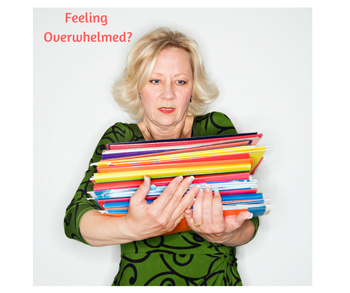
A couple of days ago I wrote a blog about depression, which seems to be a prevailing mood right now for many people. The other emotion that causes stress for many people right now is overwhelm.
“Stop the World I Want to Get Off!” is the title of a musical from the 1960’s and the hit song associated with it. I love the message, which to me says, “I’m overwhelmed. Please stop the world so I can get reoriented and catch up!” Of course, stopping the world is not an option. In fact, it seems that the world is spinning faster and faster every day.
“Overwhelm” is increasingly common as demands on human attention increase exponentially. The human brain just wasn’t designed to handle the environment we inhabit. For the vast majority of world history, human life—both culture and biology—was shaped by scarcity. Food, clothing, shelter, tools and pretty much everything else had to be farmed or fabricated, at a very high cost in time and energy. Knowledge was power, and it was hard to come by; for centuries, books had to be copied by hand and were rare and precious. Even people were scarce: Friends and relatives died young (as late as 1900, life expectancy in the United States was approximately 49 years). This kind of scarcity still rules the world’s poorest regions. But in the developed world, hundreds of millions of us now face the bizarre problem of surfeit. Yet our brains, instincts and socialized behavior are still geared to an environment of lack. The result? Overwhelm—on an unprecedented scale. –Martha Beck
Understanding the cause of your overwhelm, can help you overcome it, but sometimes the cause eludes you. Often that’s because the feeling is a result of multiple factors — not just one or two. So, what can we do to help ourselves?
Martha Beck, author of The Four-Day Win, advises that we take the following steps:
“STEP ONE: Unclog your overwhelmed brain.
To begin, free your attention bottleneck by closing your eyes and taking deep, slow breaths. Concentrate only on the feeling, sound, taste, and smell of the air going into and out of your lungs.
STEP TWO: Choose a search image.
Pick an arbitrary category of items as your search image—for example, “things that are blue.” Repeat the word blue as you open your eyes. Notice that blue things appear, and that other items become blurred. This is normal.
STEP THREE: Switch images.
Close your eyes again, breathing in and out until you feel relaxed, and choose a new category, such as “round things” (or tall women, or green cars, or whatever).
STEP FOUR: Relax to focus.
You may find that you can’t visualize your selected search images, that you’re distracted by noises, colors, activity. This happens because you’re not used to setting your own attention focus. Instead of concentrating harder, think softer. Relax your senses; mentally repeat your search phrase (“blue,” “round things,” “tall women,” “green car”). Gradually, you’ll find that your eyes locate the image on their own.
STEP FIVE: Bring focus to a familiar activity.
Once you can target your attention while holding still, practice the same exercise during an ordinary activity like driving or jogging. As you cruise along, repeat the search-image phrase, “anything that moves.” This will make you more alert to things that will keep you safe.
STEP SIX: Tackle the hard stuff.
Finally, take your attention-directing skills into a situation that usually overwhelms you. For Paula, it’s her cluttered house; for Sonya, her schedule. Instead of diving in, they need to set their attention focus prior to entering the danger zone. Think of this as a mission statement—a carefully defined surgical strike, rather than a vague plan to do better. For Paula, a useful goal might be “I’ll go into the home office, locate three books I haven’t touched for years, and donate them to the library.” Sonya might attack her planner with the mission “I’ll cancel one commitment that isn’t totally necessary.”
Give this a try if you are suffering from emotional overwhelm, and let us know in the comments below how this “prescription” worked for you.
Authentic Living Newsletter Subscription
Let us know your thoughts on this!